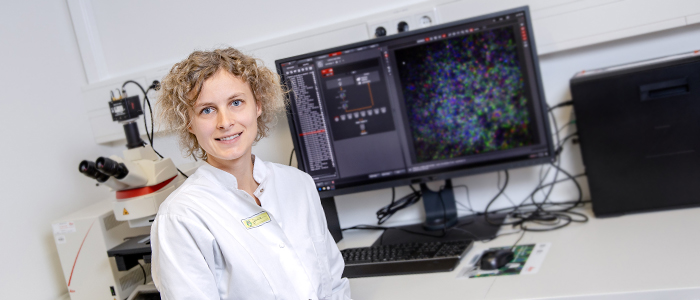
Professor Dr. Julia Bornhorst
Food Chemistry
Functions
Decentralized Equal opportunities officer (School of Mathematics and Natural Sciences)
Research
The AG Bornhorst deals with the effects of over- and undersupply of trace elements and metals.
The main focus is on the role of environmental and food-relevant metals, especially trace elements (TE), in biological processes. With the help of models such as cells and nematodes (Caenorhabditis elegans (C. elegans)), the effects of over- and undersupply on the organism's health will be better understood.
The investigation of the induction of oxidative stress, neurodegenerative potential, and the genotoxicity and mutagenicity of a compound receives special emphasis. Furthermore, the role of genetic predispositions such as Parkinson's disease is under investigation. It is important to understand how a specific genetic background of a particular disease can influence the TE status or sensitize the organism to TE toxicity.
Publikationen
The role of poly(ADP-ribose) polymerases in manganese exposed Caenorhabditis elegans.
C. Neumann, J. Baesler, G. Steffen, M. M. Nicolai, T. Zubel, M. Aschner, A. Bürkle, A. Mangerich, T. Schwerdtle, J. Bornhorst
J Trace Elem Med Biol 2020, 57:21-27
Zn homeostasis in genetic models of Parkinson's disease in Caenorhabditis elegans.
J. Baesler, J. Kopp, G. Pohl, M. Aschner, H. Haase, T. Schwerdtle, J. Bornhorst
J Trace Elem Med Biol 2019 55: 44-49.
Treatment of Caenorhabditis elegans with Small Selenium Species Enhances Antioxidant Defense Systems.
Rohn, S. Raschke, M. Aschner, S. Tuck, D. Kuehnelt, A. Kipp, T. Schwerdtle, J. Bornhorst
Mol Nutr Food Res. 2019 May;63(9):e1801304. doi: 10.1002/mnfr.201801304.
Impact of manganese on and transfer across blood-brain and blood-cerebrospinal fluid barrier in vitro.
J. Bornhorst, C. A. Wehe, S. Hüwel, U. Karst, H. J. Galla, T. Schwerdtle
J Biol Chem 2012, 287, 21, 17140-51.
